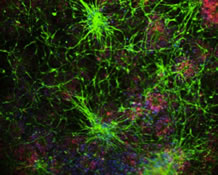Columbia University
Irving Medical Center
Neurological Institute
710 West 168th Street, 3rd floor
(212) 305-1818
Research
Investigator Resources
New York Brain Bank
The New York Brain Bank (NYBB) at Columbia University was established to collect postmortem human brains to meet the needs of neuroscientists investigating specific neurodegenerative disorders.
The tasks of the NYBB include:
- • Collection and processing of human postmortem brain samples for research.
- • Neuropathological evaluation and diagnosis.
- • Storage and computerized inventory of brain samples.
- • Distribution of brain samples to investigating clinicians and scientists.
Due to limited funds and the high costs of processing, categorizing, and storing brain samples for research, only brains of patients who were evaluated clinically at Columbia University and for whom documented clinical assessments are available are eligible for donation to the NYBB.
Families or individuals seeking information on voluntary brain donation to facilitate vital scientific research on complex neurodegenerative diseases, such as Alzheimer’s disease, Parkinson’s disease, Lewy body dementia, frontotemporal dementia, and amyotrophic lateral sclerosis, are encouraged to visit our Voluntary Brain Donation Program.
Please note, we do not collect brains for psychiatric patients at the NYBB, but inquiries regarding these donations can be directed to Dr. Andrew Teich at aft25@cumc.columbia.edu.
Permitted Users:
Clinicians or scientists from Columbia University or other institution may utilize the Facility. To obtain tissue samples, users must: (1) agree to use the tissue only for the expressed purpose, (2) acknowledge the Federal grants supporting the NYBB in any publication resulting from the use of the tissue, (3) utilize safe and proper techniques for handling post-mortem human tissue, and (4) forward a letter from their Institutional Review Board (IRB) stating that the research protocol involving the use of these tissue samples has been approved.
Methods:Â
For more information, please contact the staff of the New York Brain Bank at (212) 305-2299.
Online Predictor Tool
In order to facilitate improved long-term treatment and care, Taub researchers are broadly examining health-related quality of life and functionality in patients at various stages of Alzheimer's disease. The Institute's successful work in this area has already resulted in the creation of an online Predictor, an algorithmic tool for estimating the length of time until an individual with a Alzheimer's disease will require more attentive care. This tool helps patients, their families, and health care professionals to make more informed long-term treatment decisions and assistance preparations.

